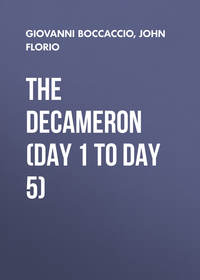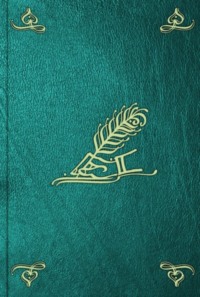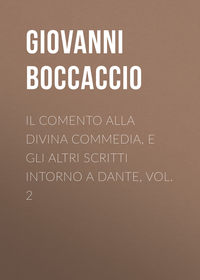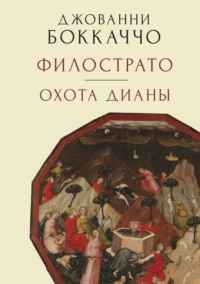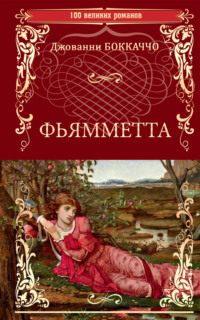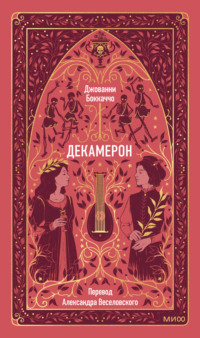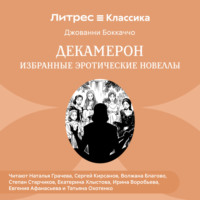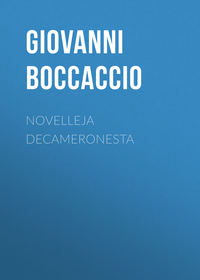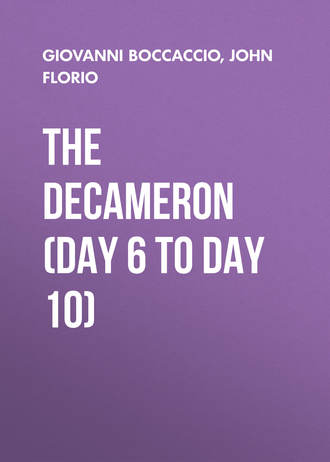 полная версия
полная версияThe Decameron (Day 6 to Day 10)
It chanced upon a day, that Signior Guido departing from the Church of Saint Michaell d'Horta, and passing along by the Adamari, so farre as to Saint Johns Church, which evermore was his customarie Walke: many goodly Marble Tombes were then about the saide Church, as now adayes are at Saint Reparata, and divers more beside. He entring among the Collumbes of Porphiry, and the other Sepulchers being there, because the doore of the Church was shut: Signior Betto & his companie, came riding from S. Reparata, & espying Signior Guido among the graves and tombes, said. Come, let us go make some jests to anger him. So putting the spurs to their horses, they rode apace towards him: and being upon him before he perceived them, one of them said. Guido thou refusest to be one of our society, & seekest for that which never was: when thou hast found it, tell us, what wilt thou do with it?
Guido seeing himselfe round engirt with them, sodainly thus replyed: Gentlemen, you may use mee in your owne house as you please. And setting his hand on one of the Tombes (which was some-what great) he tooke his rising, and leapt quite over it on the further side, as being of an agile and sprightly body, and being thus freed from them, he went away to his owne lodging. They stoode all like men amazed, strangely looking one upon another, and began afterward to murmure among themselves: That Guido was a man without any understanding, and the answer which he had made unto them, was to no purpose, neither savoured of any discretion, but meerely came from an empty brain because they had no more to do in the place where now they were, then any of the other Citizens, and Signior Guido (himselfe) as little as any of them; whereto Signior Betto thus replyed.
Alas Gentlemen, it is you your selves that are void of understanding: for, if you had but observed the answer which he made unto us: hee did honestly, and (in verie few words) not onely notably expresse his owne wisedome, but also deservedly reprehend us. Because, if wee observe things as we ought to doe, Graves and Tombes are the houses of the dead, ordained and prepared to be their latest dwellings. He tolde us moreover, that although we have heere (in this life) other habitations and abidings; yet these (or the like) must at last be our houses. To let us know, and all other foolish, indiscreete, and unlearned men, that we are worse then dead men, in comparison of him, and other men equall to him in skill and learning. And therefore, while wee are heere among these Graves and Monuments, it may well be said, that we are not farre from our owne houses, or how soone we shall be possessors of them, in regard of the frailty attending on us.
Then every one could presently say, that Signior Guido had spoken nothing but the truth, and were much ashamed of their owne folly, and shallow estimation which they had made of Guido, desiring never more after to meddle with him so grossely, and thanking Signior Betto, for so well reforming their ignorance, by his much better apprehension.
Fryer Onyon, promised certaine honest people of the Countrey, to shew them a Feather of the same Phoenix, that was with Noah in his Arke. In sted whereof, he found Coales, which he avouched to be those very coals, wherewith the same Phoenix was roastedThe Tenth Novell
Wherein may be observed, what palpable abuses do many times passe, under the counterfeit Cloake of ReligionWhen all of them had delivered their Novels, Dioneus knowing that it remained in him to relate the last for this day: without attending for any solemne command (after he had imposed silence on them, that could not sufficiently commend the witty reprehension of Guido) thus he began. Wise and worthy Ladies, although by the priviledge you have granted, it is lawfull for me to speake any thing best pleasing to my self: yet notwithstanding, it is not any part of my meaning, to varrie from the matter and method, whereof you have spoken to very good purpose. And therefore, following your footsteppes, I entend to tell you, how craftily, and with a Rampiar sodainly raised in his owne defence: a Religious Frier of Saint Anthonies Order, shunned a shame, which two wily companions had prepared for him. Nor let it offend you, if I run into more large discourse, then this day hath bene used by any, for the apter compleating of my Novell: because, if you well observe it, the Sun is as yet in the middest of heaven, and therefore you may the better forbeare me.
Certoldo, as (perhaps) you know, or have heard, is a Village in the Vale of Elsa, and under the authority and commaund of our Florence, which although it be but small: yet (in former times) it hath bin inhabited with Gentlemen, and people of especiall respect. A religious Friar of S. Anthonies Order, named Friar Onyon, had long time used to resort thither, to receive the benevolent almes, which those charitably affected people in simplicity gave him, & chiefly at divers daies of the year, when their bounty and devotion would extend themselves more largely then at other seasons. And so much the rather, because they thought him to be a good Pastor of holy life in outward appearance, & carried a name of much greater matter, then remained in the man indeed; beside, that part of the country yeilded far more plentifull abundance of Onyons, then all other in Tuscany elsewhere, a kinde of foode greatly affected by those Friars, as men alwaies of hungry & good appetite. This Friar Onyon was a man of little stature, red haire, a chearfull countenance, and the world afforded not a more crafty companion, then he. Moreover, albeit he had very little knowledge or learning, yet he was so prompt, ready & voluble of speech, uttering often he knew not what himselfe: that such as were not wel acquainted with his qualities, supposed him to be a singular Rhetoritian, excelling Cicero or Quintilian themselves; & he was a gossip, friend, or deerely affected, by every one dwelling in those parts. According to his wonted custome, one time he went thither in the month of August, and on a Sunday morning, when all the dwellers thereabout, were present to heare Masse, and in the chiefest Church above all the rest: when the Friar saw time convenient for his purpose, he advanced himselfe, and began to speake in this manner.
Gentlemen and Gentlewomen, you know you have kept a commendable custom, in sending yeerly to the poore brethren of our Lord Baron S. Anthony, both of your Corne and other provision, some more, some lesse, all according to their power, means, and devotion, to the end that blessed S. Anthony should be the more carefull of your oxen, sheep, asses, swine, pigs, and other cattle. Moreover, you have used to pay (especially such as have their names registred in our Fraternity) those duties which annually you send unto us. For the collection whereof, I am sent by my Superior, namely our L. Abbot, & therfore (with Gods blessing) you may come after noone hither, when you shal heare the Bels of the Church ring: then will I make a predication to you; you shall kisse the Crosse, and beside, because I know you al to be most devout servants to our Lord Baron S. Anthony, in especiall grace and favor, I wil shew you a most holy and goodly Relique, which I my selfe (long since) brought from the holy Land beyond the seas. If you desire to know what it is, let me tell you, that it is one of the Feathers of the same Phoenix, which was in the Arke with the Patriarch Noah. And having thus spoken, he became silent, returning backe to heare Masse. While hee delivered these and the like speeches, among the other people then in the church, there were two shrewde and crafty Companions; the one, named John de Bragoniero, and the other, Biagio Pizzino. These subtile Fellowes, after they had heard the report of Fryer Onyons Relique: although they were his intimate friends, and came thither in his company; yet they concluded betweene themselves, to shew him a tricke of Legierdumaine, and to steale the Feather from him. When they had intelligence of Friar Onyons dining that day at the Castle, with a worthy Friend of his: no sooner was he set at the Table, but away went they in all haste, to the Inne where the Fryar frequented, with this determination, that Biagio should hold conference with the Friars boy, while his fellow ransackt the Wallet, to finde the Feather, and carry it away with him, for a future observation, what the Friar would say unto the people, when he found the losse of the Feather, and could not performe his promise to them.
The Fryars Boy, whom some called Guccio Balena, some Guccio Imbrata, and others Guccio Porco, was such a knavish Lad, and had so many bad qualities, as Lippo Topo the cunning Painter, or the most curious Poeticall wit, had not any ability to describe them. Friar Onyon himself did often observe his behaviour, and would make this report among his Friends. My Boy (quoth he) hath nine rare qualities in him, and such they are, as if Salomon, Aristotle, or Seneca had onely but one of them: it were sufficient to torment and trouble all their vertue, all their senses, & all their sanctity. Consider then, what manner of man he is like to be, having nine such rarities, yet voide of all vertue, wit, or goodnes. And when it was demaunded of Friar Onyon, what these nine rare conditions were: hee having them all readie by heart, and in rime, thus answered:
Boyes I have knowne, and seene,And heard of many:But,For Lying, Loytring, Lazinesse,For Facing, Filching, Filthinesse;For Carelesse, Gracelesse, all Unthriftinesse,My Boy excelleth any.Now, over and beside all these admirable qualities, hee hath manie more such singularities, which (in favour towards him) I am faine to conceale. But that which I smile most at in him, is that he would have a Wife in every place where he commeth, yea, and a good house to boot too: for, in regard his beard beginneth to shew it selfe, rising thicke in haire, blacke and amiable, he is verily perswaded, that all Women will fall in love with him; and if they refuse to follow him, he will in all hast run after them. But truly, he is a notable servant to mee, for I cannot speake with any one, and in never so great secrecy, but he will be sure to heare his part; and when any question is demanded of me, he standes in such awe and feare of my displeasure: that he will bee sure to make the first answer, yea or no, according as he thinketh most convenient.
Now, to proceede where we left, Friar Onyon having left this serviceable youth at his lodging, to see that no bodie should meddle with his commodities, especially his Wallet, because of the sacred things therein contained: Guccio Imbrata, who as earnestly affected to be in the Kitchin, as Birds to hop from branch to branch, especially, when anie of the Chamber-maides were there, espyed one of the Hostesses Female attendants, a grosse fat Trugge, low of stature, ill faced, and worse formed, with a paire of brests like two bumbards, smelling loathsomely of grease and sweate; downe shee descended into the Kitchin, like a Kite upon a peece of Carion. This Boy, or Knave, chuse whither you will style him, having carelesly left Fryar Onyons Chamber doore open, and all the holy things so much to be neglected, although it was then the moneth of August, when heate is in the highest predominance, yet hee would needs sit downe by the fire, and began to conferre with this amiable creature, who was called by the name of Nuta.
Being set close by her, he told her, that he was a Gentleman by Atturniship, and that he had more millions of Crownes, then all his life time would serve him to spend; beside those which he payed away dayly, as having no convenient imployment for them. Moreover, he knew how to speake, and do such things, as were beyond wonder or admiration. And, never remembring his olde tatterd Friars Cowle, which was so snottie and greazie, that good store of kitchin stuffe might have beene boiled out of it; as also a foule slovenly Trusse or halfedoublet, all baudied with bowsing, fat greazie lubberly sweating, and other drudgeries in the Convent Kitchin, where he was an Officer in the meanest credite. So that to describe this sweet youth in his lively colours, both for naturall perfections of body, and artificiall composure of his Garments; never came the fowlest silks out of Tartaria or India, more ugly or unsightly to bee lookt upon. And for a further addition to his neate knavery, his breeches were so rent betweene his legges, his shooes and stockings had bin at such a mercilesse massacre: that the gallantest Commandador of Castile (though he had never so lately bin releast out of slavery) could have wisht for better garments, then he; or make larger promises, then he did to his Nuta. Protesting to entitle her as his onely, to free her from the Inne and Chamber thraldomes, if she would live with him, be his Love, partaker of his present possessions, and so to succeed in his future Fortunes. All which bravadoes, though they were belcht foorth with admirable insinuations: yet they converted into smoke, as all such braggadochio behaviours do, and he was as wise at the ending, as when he began.
Our former named two craftie Companions, seeing Guccio Porco so seriously employed about Nuta, was there-with not a little contented, because their intended labour was now more then halfe ended. And perceiving no contradiction to crosse their proceeding, into Friar Onyons chamber entred they, finding it ready open for their purpose: where the first thing that came into their hand in search, was the wallet. When they had opened it, they found a small Cabinet, wrapped in a great many foldings of rich Taffata; and having unfolded it, a fine formall Key was hanging thereat: wherewith having unlockt the Cabinet, they found a faire Feather of a Parrots taile, which they supposed to bee the verie same, that he meant to shew the people of Certaldo. And truly (in those dayes) it was no hard matter to make them beleeve anything, because the idle vanities of Ægypt and those remoter parts, had not (as yet) bin seene in Tuscany, as since then they have bin in great abundance, to the utter ruine (almost) of Italy.
And although they might then be knowne to very few, yet the inhabitants of the Country generally, understoode little or nothing at all of them. For there, the pure simplicitie of their ancient predecessours still continuing; they had not seene any Parrots, or so much as heard any speech of them. Wherefore the two crafty consorts, not a little joyfull of finding the Feather, tooke it thence with them, and beecause they would not leave the Cabinet empty, espying Char-coales lying in a corner of the Chamber, they filled it with them, wrapping it up againe in the Taffata, and in as demure manner as they found it. So, away came they with the Feather, neither seene or suspected by any one, intending now to heare what Friar Onyon would say, uppon the losse of his precious Relique, and finding the Coales there placed insted thereof.
The simple men and women of the country, who had bin at morning Masse in the Church, and heard what a wonderful Feather they should see in the after noone; returned in all hast to their houses, where one telling this newes to another, and gossip with gossip consulting thereon; they made the shorter dinner, and afterward flocked in maine troopes to the Castle, contending who shold first get entrance, such was their devotion to see the holy feather. Friar Onyon having dined, and reposed a little after his wine, he arose from the table to the window, where beholding what multitudes came to see the feather, he assured himselfe of good store of mony. Hereupon, he sent to his Boy Guccio Imbrata, that uppon the Bels ringing, he should come and bring the wallet to him. Which (with much ado) he did, so soone as his quarrell was ended in the kitchin, with the amiable Chamber-maid Nuta, away then he went with his holy commodities: where he was no sooner arrived, but because his belly was readie to burst with drinking water, he sent him to the Church to ring the bels, which not onely would warme the cold water in his belly, but likewise make him run as gaunt as a Grey-hound.
When all the people were assembled in the Church together, Friar Onyon (never distrusting any injurie offered him, or that his close commodities had bin meddled withall) began his predication, uttering a thousand lies to fit his purpose. And when he came to shew the feather of the Phoenix (having first in great devotion finisht the confession) he caused two goodly torches to be lighted, & ducking downe his head three severall times, before hee would so much as touch the Taffata, he opened it with much reverence. So soone as the Cabinet came to be seen, off went his Hood, lowly he bowed downe his body, and uttering especiall praises of the Phoenix, and sacred properties of the wonderfull Relique, the Cover of the Cabinet being lifted uppe, he saw the same to bee full of Coales. He could not suspect his Villaine boy to do this deede, for he knew him not to be endued with so much wit, onely hee curst him for keeping it no better, and curst himselfe also, for reposing trust in such a careles knave, knowing him to be slothfull, disobedient, negligent, and void of all honest understanding or grace. Sodainly (without blushing) lest his losse should be discerned, he lifted his lookes and hands to heaven, speaking out so loude, as every one might easily heare him, thus: O thou omnipotent providence, for ever let thy power be praised. Then making fast the Cabinet againe, and turning himselfe to the people, with lookes expressing admiration, he proceeded in this manner.
Lords, Ladies, and you the rest of my worthy Auditors: You are to understand, that I (being then very young) was sent by my Superiour, into those parts, where the Sun appeareth at his first rising. And I had received charge by expresse command, that I should seeke for (so much as consisted in my power to do) the especiall vertues and priviledges belonging to Porcellane, which although the boyling thereof bee worth but little, yet it is very profitable to any but us. In regard whereof, being upon my journey, and departing from Venice, passing along the Borgo de Grecia, I proceeded thence (on horseback) through the Realme of Garbo, so to Baldacca, till I came to Parione; from whence, not without great extremity of thirst, I arrived in Sardignia.
But why do I trouble you with the repetition of so many countries? I coasted on still, after I had past Saint Georges Arme, into Trussia, and then into Bussia, which are Countries much inhabited, and with great people. From thence I went into the Land of Lying, where I found store of the Brethren of our Religion, and many other beside, who shunned all paine and labour, onely for the love of God, and cared as little, for the paines and travailes which others tooke, except some benefit arised thereby to them; nor spend they any money in this Country, but such as is without stampe. Thence I went into the Land of Abruzzi, where the men and women goe in Galoches over the Mountaines, and make them garments of their Swines guts. Not farre from thence, I found people, that carried bread in their staves, and wine in Satchels, when parting from them, I arrived among the Mountaines of Bacchus, where all the waters run downe with a deepe fall, and in short time, I went on so far, that I found my selfe to be in India Pastinaca; where I swear to you by the holy habit which I weare on my body, that I saw Serpents flye, things incredible, and such as were never seene before.
But because I would be loth to lye, so soone as I departed thence, I met with Maso de Saggio, who was a great Merchant there, and whom I found cracking Nuts, and selling Cockles by retale. Neverthelesse, al this while I could not finde what I sought for, and therefore I was to passe from hence by water, if I intended to travaile thither, and so in returning back, I came into the Holy Land, where coole fresh bread is sold for fourepence, and the hot is given away for nothing. There I found the venerable Father (blame me not I beseech you) the most woorthie Patriarch of Jerusalem, who for the reverence due to the habite I weare, and love to our Lord Baron Saint Anthony, would have me to see al the holy Reliques, which he had there under his charge: whereof there were so many, as if I should recount them all to you, I never could come to a conclusion. But yet, not to leave you discomforted, I will relate some few of them to you.
First of all, he shewed me the finger of the holy Ghost, so whole and perfect, as ever it was. Next, the nose of the Cherubin, which appeared to Saint Frances; with the payring of the naile of a Seraphin; and one of the ribbes of Verbum caro, fastened to one of the Windowes, covered with the holy garments of the Catholique Faith. Then he tooke me into a darke Chappel, where he shewed me divers beames of the Starre that appeared to the three Kings in the East. Also a Violl of Saint Michaels sweate, when he combatted with the divell: And the jaw-bone of dead Lazarus, with many other precious things beside. And because I was liberall to him, giving him two of the Plaines of Monte Morello, in the Vulgare Edition, and some of the Chapters del Caprezio, which he had long laboured in search of; he bestowed on me some of his Reliques.
First, he gave me one of the eye-teeth of Santa Crux; and a little Violl, filled with some part of the sound of those Belles, which hung in the sumptuous Temple of Salomon. Next, he gave mee the Feather of the Phoenix, which was with Noah in the Arke, as before I told you. And one of the Woodden Pattens, which the good Saint Gerrard de Magnavilla used to weare in his travailes, and which I gave (not long since) to Gerrardo di Bousy at Florence, where it is respected with much devotion. Moreover, he gave me a few of those Coales, wherewith the Phoenix of Noah was roasted; all which things I brought away thence with me. Now, most true it is, that my Superiour would never suffer mee to shew them any where, untill he was faithfully certified, whether they were the same precious Reliques, or no. But perceyving by sundrie Myracles which they have wrought, and Letters of sufficient credence receyved from the reverend Patriarch, that all is true, he hath graunted me permission to shew them, and because I wold not trust any one with matters of such moment, I my selfe brought them hither with me.
Now I must tell you, that the Feather of the same Phoenix, I conveyed into a small Cabinet or Casket, because it should not be bent or broken. And the Coales wherewith the said Phoenix was roasted, I put into another Casket, in all respects so like to the former, that many times I have taken one for another. As now at this instant it hath bin my fortune: for, imagining that I brought the Casket with the feather, I mistooke my self, & brought the other with the coales. Wherein doubtles I have not offended, because I am certaine, that we of our Order do not any thing, but it is ordred by divine direction, and our blessed Patron the Lorde Baron Saint Anthony. And so much the rather, because about a senight hence, the Feast of Saint Anthony is to bee solemnized, against the preparation whereof, and to kindle your zeale with the greater fervencie: he put the Casket with the Coales into my hand, meaning, to let you see the Feather, at some more fitting season. And therefore my blessed Sonnes and Daughters, put off your Bonnets, and come hither with devotion to looke upon them. But first let me tell you, whosoever is marked by any of these Coales, with the signe of the Crosse: he or she shal live all this yeare happily, and no fire whatsoever shall come neere to touch or hurt them. So, singing a solemne Antheme in the praise of S. Anthony, he unveyled the Casket, and shewed the Coales openly.


